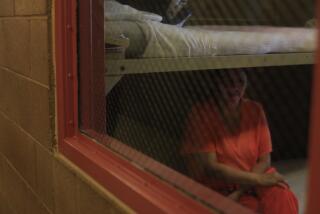State Prison Crowding Emergency Declared
SACRAMENTO — With California’s jam-packed prisons nearly out of room for more felons, Gov. Arnold Schwarzenegger on Wednesday proclaimed a state of emergency, an unusual move that could allow the transfer of inmates as soon as next month to other states without their consent.
The governor said he was taking the extraordinary step because teeming conditions have created a health risk and “extreme peril” for officers and inmates at 29 of the state’s 33 prisons.
Crowding is so severe, the governor’s emergency decree says, that it has overwhelmed water, sewer and electrical systems at some prisons and fueled hundreds of prison riots, melees and smaller disturbances in the last year. At one maximum security prison, in Folsom, violence is so prevalent all inmates are now fed in their cells.
Without immediate action, officials said they would run out of prison beds next summer. That would leave inmates to pile up in county jails, many of which are already overcrowded or operate under court-imposed population caps that force them to grant some felons early release.
“Our prisons are now beyond maximum capacity, and we must act immediately and aggressively to resolve this issue,” Schwarzenegger said in a statement.
Prisoner rights advocates questioned the timing of the announcement.
Donald Specter, director of the Prison Law Office, a nonprofit firm that has won numerous lawsuits challenging conditions inside state lockups, called the emergency declaration “political theater” by a governor running for reelection.
“Why now? This is an idiotic thing to be spending time on, because the number of beds they will be able to find in other states will amount to a grain of sand on a beach,” Specter said. “In terms of serious reform, there is nothing about this that makes sense.”
At a media briefing, Corrections Secretary James Tilton said the troubles are so pervasive that he could not wait for legislators to act. He said the emergency proclamation allows him to skirt the state’s cumbersome competitive-bidding process and sign contracts for out-of-state beds quickly.
Tilton said officials would begin by transferring volunteers as early as November and, if necessary, create more space later through mandatory moves.
Though overcrowding has long been an issue in the state’s lockups, it has reached crisis levels over the last few years, with most of California’s prisons packed to twice their intended capacity.
Of the 172,000 men and women behind bars, about 17,000 are in what Tilton called “bad beds” -- bunks in areas not designed as living space. Prisoners now sleep in converted gyms, hallways and lounges. Roughly 1,500 sleep in triple-decker bunks.
Tilton said the state is poised to sign three- to five-year contracts for 2,200 beds at private prisons in Oklahoma, Indiana, Arizona and Tennessee.
An additional 19 states have expressed an interest in housing California’s felons, he said, representing a total of about 10,000 beds in private and government facilities.
Based on early negotiations, Tilton predicted the cost of housing inmates out of state would be less than the in-state costs. The out-of-state facilities would need to provide the same protections to inmates that they receive under California law, Tilton said.
Tilton said he hoped to begin the transfers with 200 male inmates next month and continue transferring 100 to 200 weekly, after a screening process places convicts with facilities that match their security level.
A recent survey by authorities in the prisons suggested that as many as 19,500 convicts were interested in a voluntary transfer, though Tilton said the number may not be solid.
“We want to make sure they know that this does not mean early release in Florida,” Tilton quipped, noting that the initial survey, completed by 141,833 inmates, was not a binding agreement.
Many of those who volunteer could also be screened out if they have serious mental health or medical problems. Tilton said such inmates require special handling because the medical and mental health care in California’s prisons are under federal oversight after two class-action lawsuits against the state.
If mandatory transfers are necessary, officials will target two categories of inmates first: illegal immigrants scheduled for deportation upon release and prisoners who would be paroled to states other than California.
Lawyers for inmates said that although they support voluntary transfers, they would challenge any involuntary moves.
Democratic lawmakers also criticized the Republican governor, saying he had dawdled despite repeated warnings about the growing problems. Last fall, for instance, the chief of adult prisons said in a memo that a “population crisis” was creating “an imminent and substantial threat to the public safety.”
“If he had listened to his own people back then, we wouldn’t be in this crisis,” said Assemblyman Mark Leno (D-San Francisco), chairman of the Assembly Public Safety Committee.
Leno said the Schwarzenegger administration could have eased crowding early on through parole reform, specifically, by allowing thousands of low-level parole violators to face sanctions in their communities rather than returning them to prison.
Corrections officials said they have been working on short- and long-term solutions to the crowding crisis, but noted that their plans were rejected by lawmakers during the recent special session on prisons that Schwarzenegger called this summer.
That session ended in August, when legislators said no to a $6-billion package of proposals from the governor. They included forcible transfers out of state of 5,000 illegal immigrant felons facing deportation, the use of private facilities in California to house 4,000 low-security inmates, and the transfer of 4,500 nonviolent female prisoners -- about 40% of the total of incarcerated women -- to regional correctional centers.
Legislators said the governor’s package was hastily assembled, and some Democrats said the mandatory out-of-state transfers could be unconstitutional. They asked the administration to return next year with a new set of proposals.
Recent projections show the prison population will continue to rise steeply.
By 2011, the forecast shows, California would have more than 193,000 inmates, equal to the population of Irvine.
Though concerned about the population crunch and extra risk posed to their members, the state’s prison guards union expressed skepticism about the idea of out-of-state transfers, especially mandatory moves.
“If you do something mandatory, violence will go up,” said Robert Dean, spokesman for the California Correctional Peace Officers Assn. “These guys aren’t going to want to leave their families behind, I can tell you that.”
More to Read
Get the L.A. Times Politics newsletter
Deeply reported insights into legislation, politics and policy from Sacramento, Washington and beyond. In your inbox three times per week.
You may occasionally receive promotional content from the Los Angeles Times.










